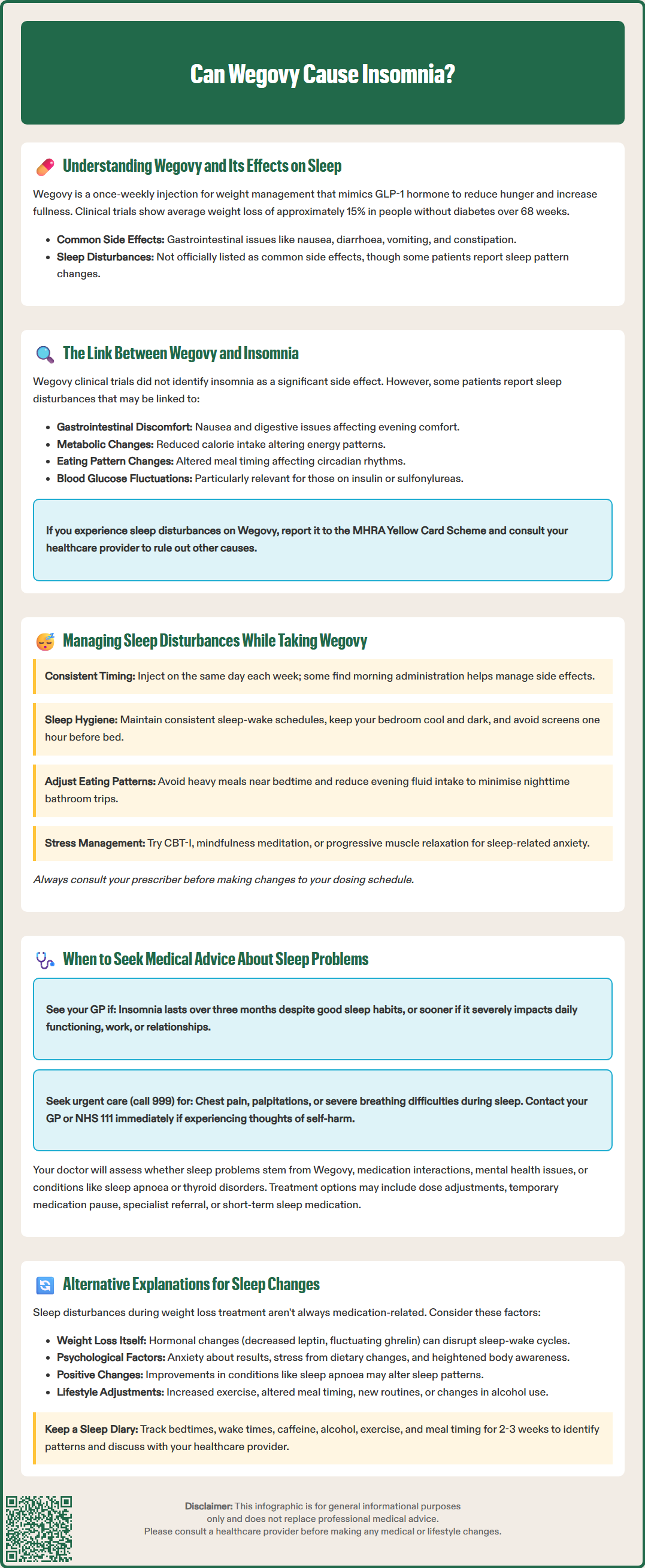
Wegovy (semaglutide 2.4 mg) is a glucagon-like peptide-1 receptor agonist licensed for chronic weight management in adults with obesity or overweight with weight-related comorbidities. Whilst gastrointestinal side effects are well documented, some patients report sleep disturbances, including insomnia, during treatment. However, insomnia is not listed as a common adverse effect in clinical trials or regulatory documentation. Understanding whether sleep changes relate directly to Wegovy, the weight loss process itself, or other factors requires careful consideration. This article examines the evidence linking Wegovy and insomnia, explores potential mechanisms, and provides practical guidance for managing sleep difficulties during treatment.
Quick Answer: Insomnia is not established as a common side effect of Wegovy based on clinical trial data, though some patients report sleep disturbances that may relate to metabolic changes, gastrointestinal discomfort, or the weight loss process itself rather than direct medication effects.

Mounjaro® is the most innovative GLP-1 medication proven to dramatically curb appetite, hunger, and cravings to help professional men achieve substantial weight loss.
Start Here
Wegovy® is a weekly injectable GLP-1 medication with proven effectiveness in reducing appetite, hunger, and cravings to help busy professionals lose significant weight.
Start HereWegovy (semaglutide 2.4 mg) is a glucagon-like peptide-1 (GLP-1) receptor agonist licensed by the MHRA for chronic weight management in adults with obesity (BMI ≥30 kg/m²) or overweight (BMI ≥27 kg/m²) with at least one weight-related comorbidity. It is prescribed as an adjunct to a reduced-calorie diet and increased physical activity. Administered as a once-weekly subcutaneous injection, Wegovy works by mimicking the naturally occurring hormone GLP-1, which regulates appetite and food intake through actions on the brain's satiety centres.
The medication's mechanism of action involves binding to GLP-1 receptors in the hypothalamus, reducing hunger signals and increasing feelings of fullness. Additionally, semaglutide initially slows gastric emptying (an effect that attenuates over time with continued treatment), which prolongs the sensation of satiety after meals. These combined effects typically result in reduced caloric intake and subsequent weight loss, with clinical trials demonstrating weight reductions that vary by population—approximately 15% in people without diabetes (STEP 1) and 10% in those with type 2 diabetes (STEP 2) over 68 weeks.
Whilst Wegovy has proven efficacy in weight management, patients may experience various side effects as their body adjusts to the medication. The most commonly reported adverse effects are gastrointestinal in nature, including nausea, diarrhoea, vomiting, constipation, and abdominal pain. These typically occur during dose escalation and often diminish over time.
Sleep disturbances, including insomnia, are not listed amongst the common or very common side effects in the Summary of Product Characteristics (SmPC). However, some patients report changes in their sleep patterns whilst taking Wegovy. Understanding whether these sleep changes are directly attributable to the medication, related to the weight loss process itself, or due to other factors requires careful consideration of the available evidence and individual circumstances.

There is no official, established link between Wegovy and insomnia based on current clinical trial data and regulatory documentation. The pivotal STEP (Semaglutide Treatment Effect in People with obesity) clinical trials, which formed the basis for Wegovy's approval, did not identify insomnia as a significant adverse event. Sleep disturbances were not reported at notably higher rates in the semaglutide groups compared to placebo groups, and insomnia is not listed as a common adverse reaction in the UK SmPC.
However, post-marketing surveillance and patient reports suggest that some individuals do experience sleep-related issues whilst taking Wegovy. These anecdotal reports warrant consideration, even in the absence of strong clinical trial evidence. Several theoretical mechanisms might explain why some patients notice sleep changes:
Metabolic shifts: As the body adapts to reduced caloric intake and begins utilising fat stores, hormonal fluctuations may theoretically affect sleep-wake cycles
Gastrointestinal discomfort: Nausea or abdominal discomfort, particularly if experienced during evening hours, may interfere with sleep onset or maintenance
Changes in eating patterns: Altered meal timing or reduced evening food intake might affect circadian rhythms in susceptible individuals
Indirect effects: The medication's impact on blood glucose regulation could theoretically influence sleep quality, though this mechanism remains speculative
It is important to note that correlation does not imply causation. Many patients beginning Wegovy are simultaneously making significant lifestyle changes, experiencing weight loss, and potentially dealing with underlying health conditions—all factors that can independently affect sleep quality. The temporal association between starting Wegovy and experiencing insomnia does not necessarily indicate a direct pharmacological effect of the medication itself.
If you are taking Wegovy and experience new or worsening sleep disturbances, consider reporting this to the MHRA through the Yellow Card Scheme, which helps monitor medication safety. For people with diabetes who are also taking insulin or sulfonylureas, it's important to discuss with your healthcare provider whether nocturnal hypoglycaemia might be contributing to sleep disturbances.
If you experience sleep difficulties whilst taking Wegovy, several practical strategies may help improve your sleep quality without discontinuing the medication. These evidence-based approaches align with general sleep hygiene principles recommended by the NHS and sleep medicine specialists.
Optimising injection timing may be a pragmatic approach for some patients, though evidence for this is limited given Wegovy's once-weekly dosing and long half-life. Whilst Wegovy can be administered at any time of day, consistently taking your injection on the same day each week is important. Some patients find that morning administration helps them manage any gastrointestinal side effects that might otherwise affect evening comfort. Do not change your dosing schedule or adjust your dose without consulting your prescriber.
Sleep hygiene measures form the cornerstone of managing insomnia:
Maintain a consistent sleep-wake schedule, even on weekends
Create a cool, dark, quiet sleeping environment
Avoid screens (phones, tablets, computers) for at least one hour before bedtime
Limit caffeine intake, particularly after midday
Avoid alcohol close to bedtime
Engage in regular physical activity, but not within three hours of bedtime
Establish a relaxing pre-sleep routine (reading, gentle stretching, meditation)
Dietary considerations may also prove helpful. Since Wegovy affects appetite and digestion, avoid heavy meals close to bedtime. Stay well-hydrated throughout the day, but reduce fluid intake in the evening to minimise nighttime bathroom visits.
Stress management techniques such as cognitive behavioural therapy for insomnia (CBT-I), mindfulness meditation, or progressive muscle relaxation can address anxiety about sleep itself, which often perpetuates insomnia. The NHS offers online resources and apps that provide guided relaxation exercises specifically designed to improve sleep quality. CBT-I is considered the first-line treatment for persistent insomnia according to NICE guidance.
Whilst mild, transient sleep disturbances may resolve with self-management strategies, certain situations warrant medical consultation. Contact your GP if you experience:
Persistent insomnia lasting more than three months despite implementing sleep hygiene measures, or sooner if it severely affects your daily functioning
Severe sleep deprivation that impairs your ability to function safely during daytime activities, particularly if operating machinery or driving
Mood changes accompanying sleep disturbance, including persistent low mood, anxiety, or irritability that may indicate depression
Impact on quality of life, including inability to work, maintain relationships, or engage in usual activities
Seek urgent medical attention if you experience:
Chest pain or palpitations during sleep (call 999)
Severe breathing difficulties during sleep (call 999)
Thoughts of self-harm or suicide (contact your GP urgently, call NHS 111, or 999 in an emergency)
Your healthcare provider may conduct a thorough assessment to determine whether the sleep disturbance is related to Wegovy, an underlying condition, or other factors. This evaluation might include:
Review of all current medications, as drug interactions or side effects from other medicines may contribute to insomnia
Assessment for sleep disorders such as obstructive sleep apnoea (OSA), which is common in individuals with obesity and may present with loud snoring, witnessed breathing pauses during sleep, and excessive daytime sleepiness
Evaluation of mental health, as anxiety and depression frequently manifest with sleep disturbance
Consideration of other medical conditions (thyroid disorders, chronic pain, restless legs syndrome) that affect sleep
Depending on the assessment findings, your doctor may recommend adjusting your Wegovy dose, temporarily pausing treatment to assess whether symptoms resolve, or referring you to a sleep specialist for further investigation. In some cases, short-term pharmacological support for sleep may be appropriate, though this is generally reserved for severe cases and used cautiously alongside weight management medications.
When experiencing sleep disturbances whilst taking Wegovy, it is crucial to consider alternative explanations beyond a direct medication effect. Weight loss itself, regardless of the method used to achieve it, can influence sleep patterns through multiple mechanisms.
Caloric restriction and metabolic adaptation naturally accompany weight loss treatment. As your body adjusts to reduced energy intake, hormonal changes occur that may affect sleep. Research suggests that leptin and ghrelin, hormones that regulate hunger and satiety, also influence sleep-wake cycles. During weight loss, leptin levels decrease whilst ghrelin may fluctuate, potentially contributing to sleep changes. These effects are a consequence of weight loss rather than a specific medication effect, though the exact impact varies between individuals.
Psychological factors play a significant role in sleep quality during weight management. The process of losing weight can be emotionally complex, involving:
Anxiety about treatment success or failure
Heightened body awareness and preoccupation with physical changes
Stress related to dietary modifications and lifestyle adjustments
Excitement or anticipation about weight loss progress
These emotional states can manifest as difficulty falling asleep or maintaining sleep, independent of any pharmacological effect.
Improvement in obesity-related conditions may affect sleep patterns. For example, as weight decreases, obstructive sleep apnoea often improves, which can change sleep quality and architecture. Rather than assuming temporary disruption, it's important to systematically assess sleep symptoms and discuss them with your healthcare provider.
Concurrent lifestyle changes frequently accompany weight loss treatment. Increased physical activity, altered meal timing, new social routines, or changes in alcohol consumption—all common during weight management—can independently affect sleep quality. Additionally, many individuals taking Wegovy are managing multiple health conditions and taking various medications, any of which might contribute to sleep disturbance.
If sleep problems persist, maintaining a sleep diary for 2-3 weeks can help identify patterns and potential triggers. The NHS website offers sleep diary templates and guidance. Record bedtimes, wake times, naps, caffeine and alcohol intake, exercise, meal timing, and any medications taken. This information provides valuable context for your healthcare provider to determine the most likely cause and appropriate management strategy.
Insomnia is not listed as a common side effect in Wegovy's clinical trials or UK regulatory documentation. However, some patients report sleep disturbances, which may relate to metabolic changes during weight loss, gastrointestinal discomfort, or lifestyle modifications rather than a direct medication effect.
Implement sleep hygiene measures such as maintaining consistent sleep-wake schedules, creating a comfortable sleep environment, and avoiding screens before bedtime. If insomnia persists beyond three months or severely affects daily functioning, consult your GP for a thorough assessment and potential management strategies.
Wegovy can be administered at any time of day, and some patients find morning injections help manage gastrointestinal side effects that might affect evening comfort. However, maintain consistency by taking your injection on the same day each week, and do not change your dosing schedule without consulting your prescriber.
All medical content on this blog is created based on reputable, evidence-based sources and reviewed regularly for accuracy and relevance. While we strive to keep content up to date with the latest research and clinical guidelines, it is intended for general informational purposes only.
DisclaimerThis content is not a substitute for professional medical advice, diagnosis, or treatment. Always consult a qualified healthcare professional with any medical questions or concerns. Use of the information is at your own risk, and we are not responsible for any consequences resulting from its use.